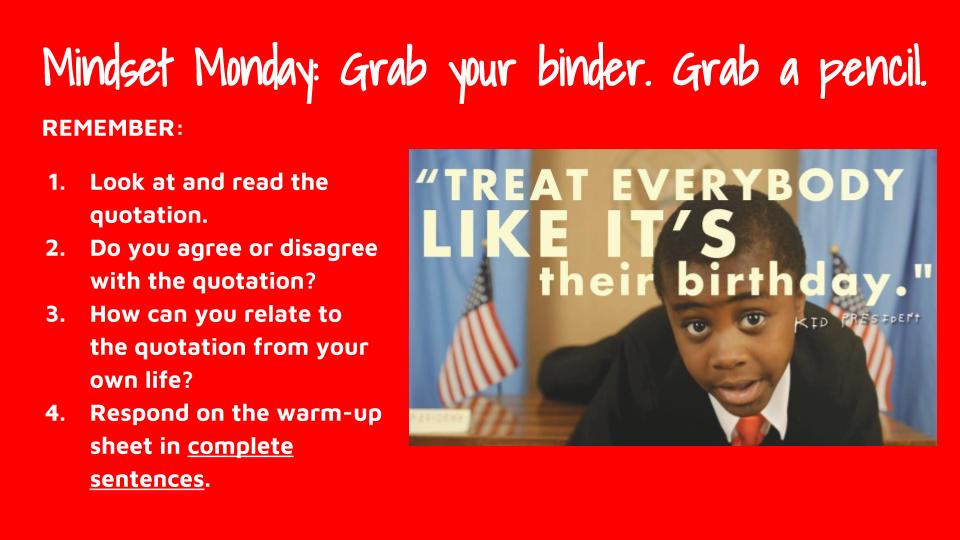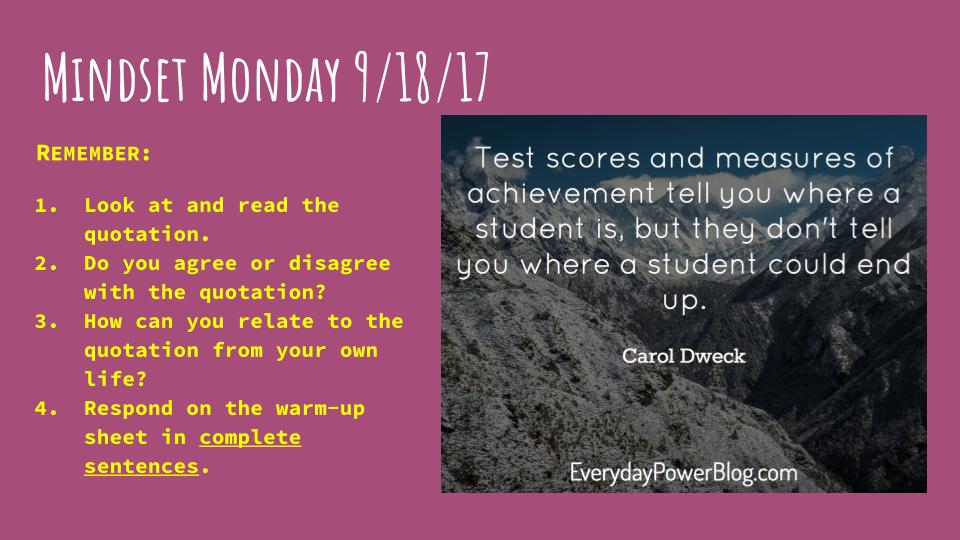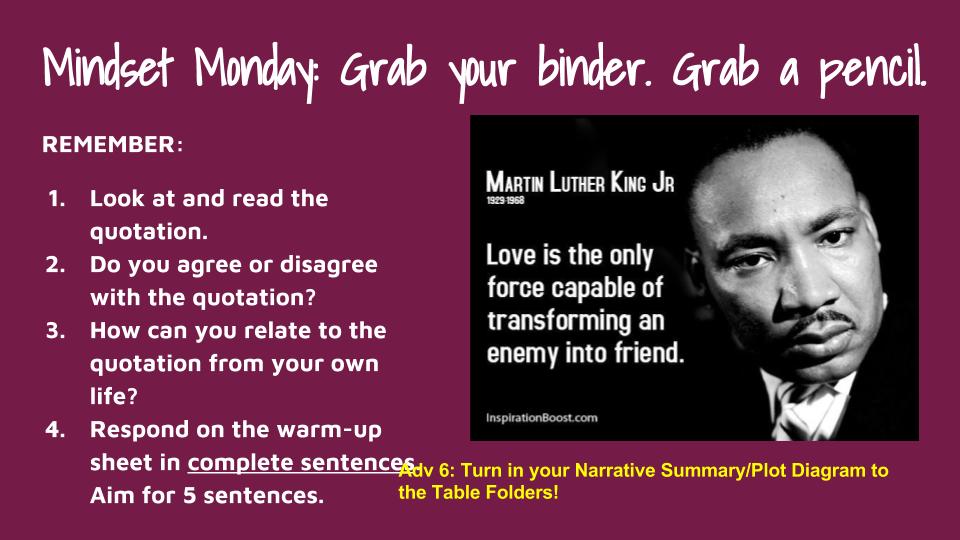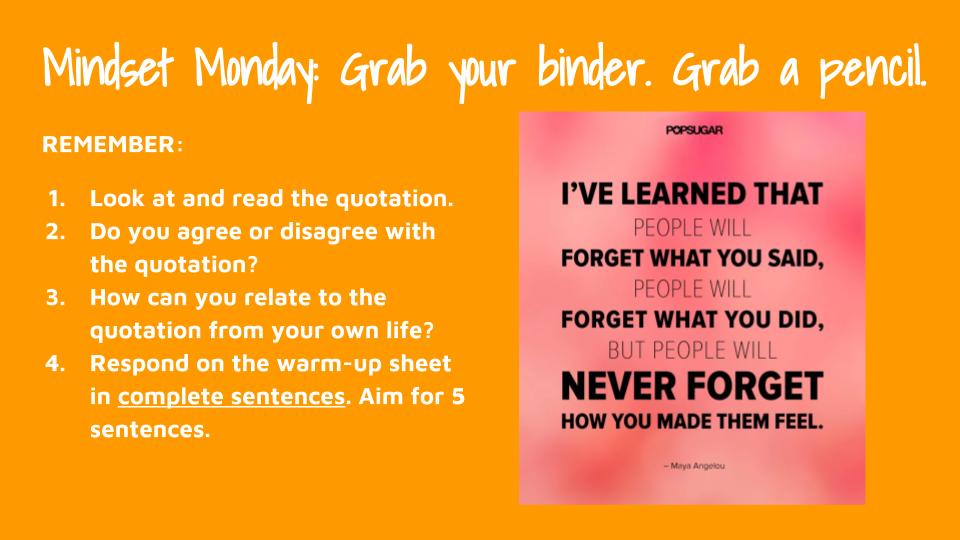Using Routine Paragraph Writing Warm-Ups
Why Are Routine Paragraphs So Powerful?
Observation #1: This writing every day thing is more difficult than imagined. Even if it is a quick write.
Observation #2: I am to the part of the school year where I am evaluating on a macro level what strategies and routines are working...and which ones are not.
One of the changes I made this year was to routine paragraph warm-ups. I was sitting in a professional development in August, and the facilitator asked the question, "who uses warm-ups to start class?" I had decided to change, but the overwhelming majority of people do use warm-ups. My question, as a person who never used warm-ups and had anticipatory sets for all lessons for each day, I was curious as to what was working and what was not. Many people use Daily 5, etc. However, I was interested in having all students write a paragraph-no ifs, ands, buts, about it. 5-7 sentences is the expectation for the daily warm-up, and all students, I repeat, all students are hitting this benchmark at this point in the school year. Routine paragraphs are expected routines on a given thematic concept for each day. They involve note-taking, opinion, or critical-thinking.
The System
Mindset Monday
Genre: Text Connections
Mindset Monday challenges students to think about their mindset. I love talking about mindset (eh-hem...writing mindset) However, the need to talk about growth mindset in a purposeful way needed to happen more than just once in a given unit. It needed to happen each week to set the tone for that week. Here are some key examples with guiding questions:
Observation #1: This writing every day thing is more difficult than imagined. Even if it is a quick write.
Observation #2: I am to the part of the school year where I am evaluating on a macro level what strategies and routines are working...and which ones are not.
One of the changes I made this year was to routine paragraph warm-ups. I was sitting in a professional development in August, and the facilitator asked the question, "who uses warm-ups to start class?" I had decided to change, but the overwhelming majority of people do use warm-ups. My question, as a person who never used warm-ups and had anticipatory sets for all lessons for each day, I was curious as to what was working and what was not. Many people use Daily 5, etc. However, I was interested in having all students write a paragraph-no ifs, ands, buts, about it. 5-7 sentences is the expectation for the daily warm-up, and all students, I repeat, all students are hitting this benchmark at this point in the school year. Routine paragraphs are expected routines on a given thematic concept for each day. They involve note-taking, opinion, or critical-thinking.
The System
Mindset Monday
Genre: Text Connections
Mindset Monday challenges students to think about their mindset. I love talking about mindset (eh-hem...writing mindset) However, the need to talk about growth mindset in a purposeful way needed to happen more than just once in a given unit. It needed to happen each week to set the tone for that week. Here are some key examples with guiding questions:
Tough Choice Tuesday
Genre: Persuasion
Tough Choice Tuesday is simply a joy to do. I love Tuesdays (even though really Mondays are my favorite...I am well rested at this point in the week). These days are essentially Would You Rather Questions. Students have to make a choice and depend their side with reasons. Besides the idea of having students defend their opinions, these types of questions are community builders. Students get a chance to see other opinions and as a teacher I can set up norms when it comes to listening to each other. Here are some examples so far:
Word Wednesday
Genre: Vocabulary Acquisition
Word Wednesday provides an opportunity to practice note-taking skills and to also gain practice with words we need to know as students and as writers. I like to incorporate either content-related words or include test-taking vocabulary words. At a recent training, we received a comprehensive list of vocabulary words related to test-taking, and this has infiltrated my teaching to certain extent. What I mean by this, is that it is meaningful to be purposeful with the test related vocabulary that students will see on high-stakes testing, but may not know how to proceed because they are tripped up by the words meaning. Words such as IDENTIFY, EVALUATE, ASSESS, CITE, INFER, etc These sets of words must be decoded for students to be successful on mandated tests, but also to become higher-order thinkers and writers. Here are some examples:
Revise-It Thursday/Library
Genre: Critical-Thinking/Evaluation
If I don't make time for grammar instruction at all times, grammar instruction will not happen. Revise-It Thursday is another way to teach editing and revising skills in writing, but to also help students with everyday conventions that they struggle with in their own writing. Punctuation, capitalization, and spelling are all addressed on Revise-It Thursday, but so are sentence fragments, sentence combining, and citing evidence correctly in text. This day is a critical component in creating not only writers, but writers that are able to edit their own work. I have students copy down a sentence word-for-word that is incorrect, and then we correct together as a class. Here are some examples:
Friday Free Write
Genre: Creative Writing
Students love Friday Free Write. Period. Year after year on the exit survey, students list Friday Free Write as a place to experiment, have fun, and use their imagination. Each week, I post 3-4 prompts on the board in case writer's block is present, and students are given time to write. They write to music we listen to as a group or music they select through headphones. I have also started to try out the Write About website to experiment with the sharing aspect of this platform.
Evaluation
PROS
Students are writing. Alot. This is more writing than I could possibly grade...but that is the point. Students need to be writing more than we can ever possibly grade.
I love the different day topics. Each one serves a purpose and a passion.
Students are able to practice real-life writing skills.
All warm-ups provide a centering focus for the lesson.
CONS
I am tempted to spend more time grading them than needed. They hold good information and student opinions...I am drawn to write lots of feedback, but I stay away because I have other writing that requires more intensive feedback that is also accessible.
The days can get old. I am toying around with changing some of the themes at the end of the first 12 weeks. Perhaps, another thematic concept? Even though I am not sure what I would change it to at all.
Students still try to rush through warm-ups sometimes. Some of the work is not representative of what students can really do.

















